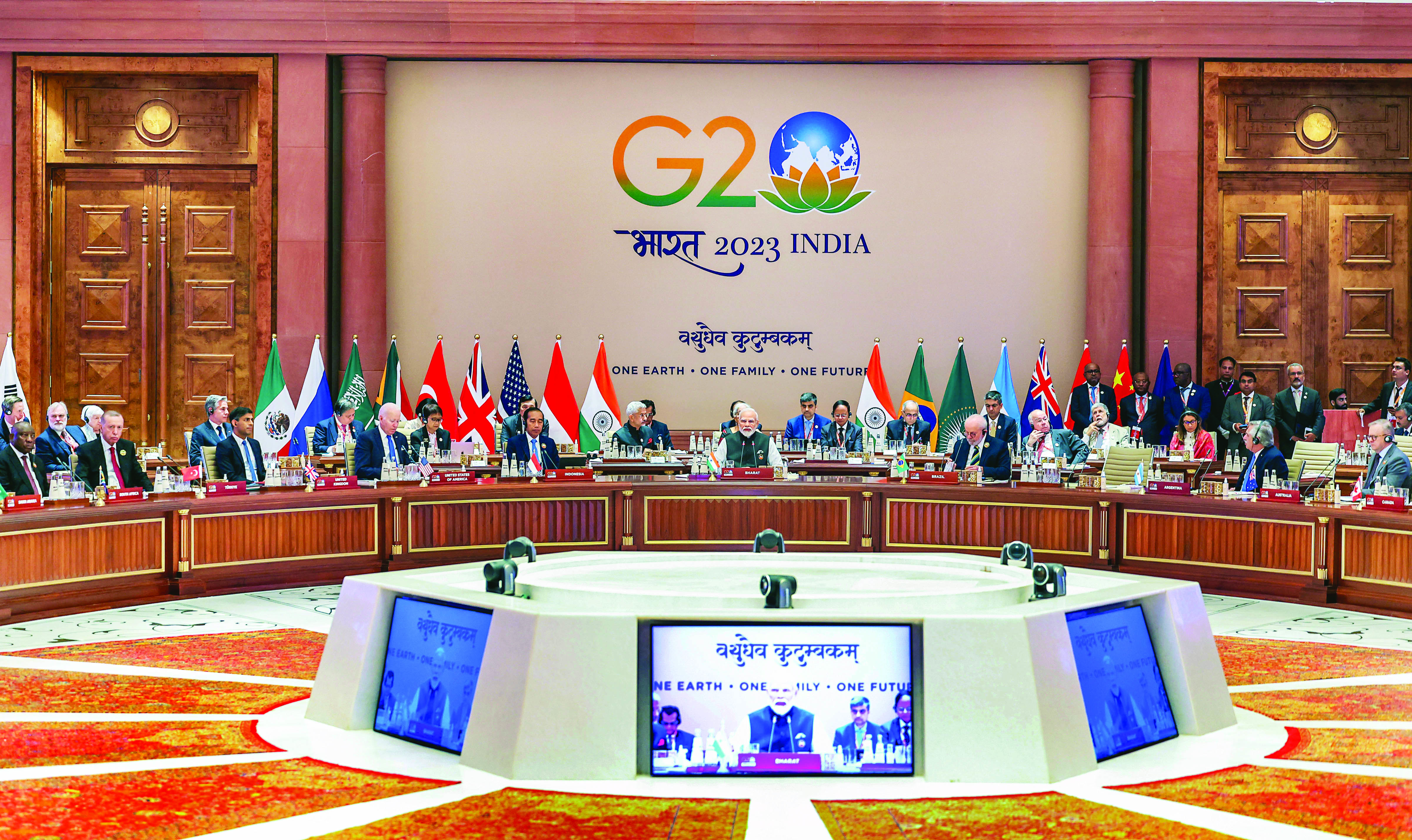G20 Summit adopts New Delhi Declaration with 100% consensus

New Delhi: Finally, India proved its mettle and got the New Delhi Leaders’ Summit Declaration adopted by the G20 countries on the second day of global leaders’ summit on Saturday. It is a significant victory for India’s G20 presidency that came amid increasing tensions and divergent views over the Ukraine conflict.
While making the historic announcement, Prime Minister Narendra Modi said that the world leaders had agreed on the content of the New Delhi Declaration.
“Have just got the good news that due to the hard work of our teams and your cooperation, a consensus has been reached on the New Delhi G20 Leaders’ Summit Declaration,” Modi told the leaders while addressing the second session of the Summit at the Bharat Mandapam.
“It is my proposal that this G20 Declaration be adopted,” the PM said. After the approval of the members, Modi said, “I announce the adoption of this Declaration”.
“On this occasion, I would like to thank our ministers, Sherpas and all officials who made this possible with their hard work,” he said.
The announcement of adoption of the New Delhi declaration has put a stop to all the speculations that were doing rounds from Friday (day one) that the G20 under India’s Presidency may face major roadblocks. However, bringing all the members of the G20 on the same page was very crucial for India to make the Presidency a grand success.
As per the joint declaration document, it focuses on accelerating progress on sustainable development goals (SDGs), green development pact for a sustainable future, strong, sustainable, balanced and inclusive growth, and more effective multilateral institutions for the 21st century, documents, technological transformation and digital public infrastructure, international taxation, countering terrorism and money laundering among other key issues.
On the contentious issue of Russia-Ukraine conflict, the declaration said, “Concerning the war in Ukraine, while recalling the discussion in Bali, we reiterated our national positions and resolutions adopted at the UN Security Council and the UN General Assembly and underscored that all states must act in a manner consistent with the Purposes and Principles of the UN Charter in its entirety.”
“In line with the UN Charter, all states must refrain from the threat or use of force to seek territorial acquisition against the territorial integrity and sovereignty or political independence of any state. The use or threat of use of nuclear weapons is inadmissible,” it further said.
On the historic achievement, India’s Sherpa to G20 Amitabh Kant said that G-20 under India’s presidency has been the most ambitious in the history of G-20 presidencies.
“With 112 outcomes and presidency documents, we have more than tripled the substantive work from previous presidencies,” he said.
Briefing about the takeaways of the New Delhi declaration, Kant said that India’s G-20 Presidency stands as a landmark occasion, symbolizing a concerted effort to address global challenges with unity and purpose.
Apart from consensus on the New Delhi Declaration, the G20 members included the 55-member states African Union as permanent members of the G-20 group.
However, without mentioning the name of China, the declaration said, “Reaffirming that the G20 is the premier forum for international economic cooperation, and recognizing that while the G20 is not the platform to resolve geopolitical and security issues, we acknowledge that these issues can have significant consequences for the global economy.”
The declaration document also appreciated the efforts of Türkiye and UN-brokered Istanbul Agreements consisting of the MoU between the Russian Federation and Secretariat of the United Nations on Promoting Russian Food Products and Fertilizers to the world markets and the initiative on the safe transportation of grain and foodstuffs from Ukrainian ports to other parts of the world — particularly those in Africa.
The declaration further recognised the critical role of private enterprise in accelerating growth and driving sustainable economic transformations.
“We resolve to work with the private sector to create inclusive, sustainable, and resilient global value chains, and support developing countries to move up the value chain, facilitate investments including Foreign Direct Investments (FDIs) towards sustainable business models,” it said.
On fight against corruption, the document said, “We reaffirm our commitment to zero tolerance for corruption and reiterate our support to enhance global efforts to seize, confiscate and return criminal proceeds to victims and states, in line with international obligations and domestic legal frameworks, including through support to the Financial Action Task Force (FATF) and operationalisation of the GlobE Network.”



